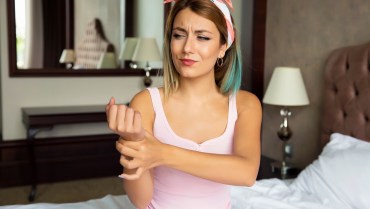Insomnia is becoming more and more widespread. Between the fast pace of life, designer coffee shops on every corner, and exposure to electromagnetic radiation from all of our devices, it’s no wonder. An estimated one in three Americans is getting less than 7 hours of sleep each night; 83 million consider themselves sleep deprived.
Why is sleep important?
During sleep we recharge our bodies in every way: we repair tissues, improve metabolic function and balance hormones, recalibrate the master clock in the brain, remove toxic waste products, integrate life events often as dreams, and generally restore homeostasis.
How much sleep should we get?
- Preschoolers need between 10 to 13 hours
- School-age children between 9 to 11 hours
- Teenagers from 8 to 10 hours
- Adults from 7 to 9 hours and
- Seniors 65 and older from 7 to 8 hours
Lifestyle recommendations to improve sleep:
- Avoid stress and excess obligations. This is a big one. Being overscheduled and overstimulated is a huge contributor to poor sleep and it isn’t sustainable. Learn to prioritize and put your energies into what’s important to you. You can actually be too tired to sleep!
- Participate in a balanced exercise program which includes high intensity short bursts (which enhance growth hormone release) and work the major muscle groups as part of strength training.
- Avoid exercising late at night.
- Take a warm epsom salt bath to relax your body and soothe your nervous system. A few drops of lavender oil added to the salts will enhance this effect.
Physical environmental considerations:
- Sleep in a totally dark environment. This includes shading or removing lights from phones, alarm clocks, night lights, etc. Total darkness helps reset the pineal gland, which regulates the timing of sleep.
- Make sure the room is cool (for most 60-67 degrees) but you are warm. For many, this means wearing socks to bed.
- Avoid watching TV and using electronic devices after 7-8 pm, depending on how sensitive you are.
- Wrap up any work at least 2 hours before bed, to allow your mind to transition to a more relaxed state.
- If you need to use your computer or device, switch to the night function or wear amber or red glasses that block out the blue light.
- Replace the LED and fluorescent lights in your home with incandescent bulbs, as they emit less of that harmful blue light.
- Minimize EMFs at night. Put your devices, yes, even cell phone, in another room and if possible, shut down your WiFi.
Timing issues:
- Develop a nightly routine that includes a hot epsom salt bath, stretching, gentle yoga, The temperature drop from a hot bath is in itself very relaxing.
- Practice stress relieving activities during the day, such as deep breathing and mindfulness breaks. This practice helps maintain the stress hormone, cortisol, in its normal range so you don’t arrive at the end of your day with sky high cortisol levels that prevent you from falling asleep. Try the 4-7-8 breathing technique. (details of this technique would make a good sidebar?)
- The most restorative time to sleep is from 10 p.m. to 2 a.m. This means being in bed by 9:30 and asleep by 10 pm. Really. If your bedtime is much later, use melatonin (3 mg is a good place for most people to start) to nudge it back to the earlier bedtime.
Dietary tips:
- Avoid caffeine after 2 pm (or altogether if you’re sensitive to it). Be aware that some medications and energy drinks can contain caffeine.
- Avoid herbs, such as kava kava, yerba mate and guarana, that have a stimulating affect. Some supplements such as B Complex and carnitine are also stimulating and should be avoided late in the day.
- Avoid alcohol and smoking, especially in the evening.
- Have a protein and fat rich bedtime snack such as a turkey roll-up, nut butter, or a small almond milk smoothie. This will help regulate your blood sugar and help you stay asleep. Hypoglycemia is a major cause of frequent night time awakening.
- Take some calcium-magnesium supplements after dinner. These minerals help to soothe the nervous system and relax muscles. We have several calcium and Magnesium products on our online store. Almonds and almond milk are very high in calcium, higher than dairy milk!
- Try CBD for both its effect on relaxation and pain relief, especially if you’re aware of body pain as a cause of sleep problems. Get the whole story on CBD here.
- Sip a cup of chamomile tea before bed. I like “Sleepytime Tea” from Celestial Seasonings, as it has a nice array of calming and tasty herbs.
Psychological influences on sleep:
- Consider keeping a journal and use it at bedtime. List your worries and concerns and then make a to-do list for the next day to clear your mind. I call it “off-loading”. Once I’ve made a list I feel much more relaxed, knowing that I won’t forget anything and can tackle the list in the morning, fully refreshed. It’s very freeing!
- If you’ve tried most of the approaches in this article and still struggling, I recommend either Emotional Free Technique (EFT) or tapping. This is a surprisingly easy therapy which you do for yourself, that helps change brain waves and can be applied to any stressful situation with excellent results.
- If you feel like you need someone else to help you overcome insomnia, there’s a relatively new therapy available called Cognitive Behavioral Therapy for Insomnia, (CBT-I). This therapy is helpful for establishing better sleep routines. We recommend working with Debra Haldeman, Ph.D., Psychologist and Insomnia Treatment Specialist. Deb sees clients at BeWell and you can reach her for information and scheduling at 412-626-7720.
Sometimes hormonal imbalances can be the underlying cause of chronic insomnia. It is often a result of low progesterone in peri-menopausal women or can be associated with low thyroid or poor adrenal function. If the insomnia persists, I suggest contacting a practitioner that is well versed in functional medicine to help resolve those underlying imbalances and restore sound sleep.
Sweet Dreams!






Add Comment